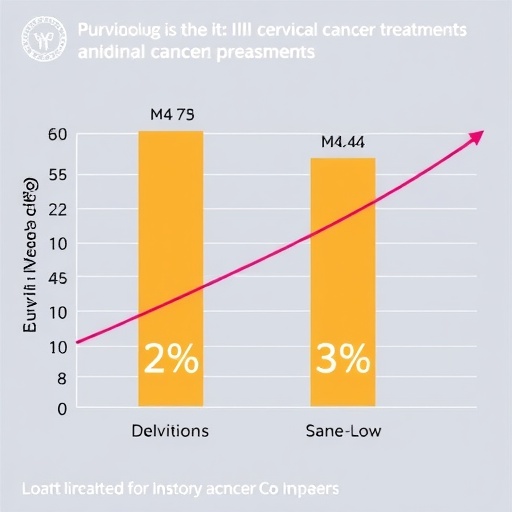In the ongoing battle against cervical cancer, particularly at advanced stages, determining the most effective treatment modalities remains a critical challenge. A recent comprehensive study published in BMC Cancer delves into the survival outcomes of patients diagnosed with stage IIIC cervical cancer, scrutinizing the efficacy of two prominent treatment strategies: radical hysterectomy (RH) and radical chemoradiotherapy (RCRT). This systematic review and meta-analysis brings together extensive patient data to shed light on which approach may offer better prognosis and survival benefits.
Stage IIIC cervical cancer, a classification based on the involvement of regional lymph nodes, marks a pivotal point in disease progression where treatment decisions can significantly impact patient outcomes. Traditionally, radical hysterectomy, a surgical procedure involving the removal of the uterus and surrounding tissues, has been a cornerstone for certain early to mid-stage cervical cancers. Alternatively, radical chemoradiotherapy, which combines chemotherapy with targeted radiotherapy, serves as a non-surgical approach aiming to eradicate tumor cells through systemic and localized assault.
This recent study rigorously analyzed data aggregated from nine independent studies encompassing 6,793 patients, allocating 3,840 individuals (56.5%) to the RH treatment group and 2,953 patients (43.5%) to the RCRT cohort. The sheer scale of this meta-analysis adds significant weight to its conclusions, offering clinicians an invaluable comparative perspective rooted in diverse patient populations and treatment protocols.
.adsslot_S0vZoOXzET{ width:728px !important; height:90px !important; }
@media (max-width:1199px) { .adsslot_S0vZoOXzET{ width:468px !important; height:60px !important; } }
@media (max-width:767px) { .adsslot_S0vZoOXzET{ width:320px !important; height:50px !important; } }
ADVERTISEMENT
The research team employed hazard ratios (HRs) as the statistical measure to evaluate survival outcomes, focusing on overall survival (OS), disease-free survival (DFS), and progression-free survival (PFS). These metrics respectively assess the probability of survival, absence of disease recurrence, and time until disease progression or relapse, providing a comprehensive overview of clinical efficacy across treatment modalities.
Despite the varied clinical practices and inherent differences among included studies, the meta-analysis revealed no statistically significant survival advantage of one treatment over the other. Specifically, the RH group demonstrated an HR of 0.77 (95% CI 0.58–1.04) for overall survival when compared to the RCRT group, suggesting comparable outcomes. Similarly, disease-free survival and progression-free survival also showed analogous hazard ratios of 0.68 and 0.67, respectively, albeit with wide confidence intervals indicating substantial variability.
The analysis, however, was marred by high heterogeneity among the studies, as indicated by the I² statistics exceeding 80% across all survival outcomes. Such heterogeneity underscores the variability in patient demographics, disease staging nuances, treatment regimens, and follow-up durations, which could influence the pooled results and interpretive clarity. This statistical diversity cautions against oversimplifying treatment recommendations without context-specific considerations.
Notably, the absence of clear superiority between radical surgery versus chemoradiotherapy resonates with the current guidelines posited by the National Comprehensive Cancer Network (NCCN), which advocate for individualized treatment decisions factoring patient health status, tumor characteristics, and resource availability. These findings reinforce the existing clinical paradigm that no one-size-fits-all approach exists for stage IIIC cervical cancer.
One intriguing aspect highlighted is the potential role of biological and molecular tumor heterogeneity in mediating treatment responses. As cervical cancer is driven primarily by persistent human papillomavirus (HPV) infection but manifests with diverse histopathological subtypes and genetic profiles, therapeutic sensitivities may differ significantly, influencing survival outcomes beyond the chosen treatment modality.
The implications of this meta-analysis extend to resource-limited settings where access to sophisticated chemoradiotherapy may be constrained. Understanding that survival outcomes are broadly comparable enables flexibility in adapting treatment protocols to local infrastructure while maintaining acceptable clinical standards.
Furthermore, the wide confidence intervals and incomplete data on certain survival endpoints, such as progression-free survival, highlight the pressing need for prospective, randomized controlled trials with standardized protocols to minimize heterogeneity and refine evidence quality. Such trials could also elucidate surrogate markers predicting treatment responsiveness, enabling precision medicine approaches in cervical cancer care.
It is also paramount to consider quality of life and long-term sequelae in treatment planning. Radical hysterectomy, while potentially curative, can impact reproductive function and evoke postoperative complications. Chemoradiotherapy may be associated with radiation-induced toxicities affecting adjacent organs. Balancing survival benefits against morbidity profiles constitutes a pivotal aspect of therapeutic decision-making.
Moreover, integrating emerging immunotherapeutic agents and targeted therapies with current treatment modalities could transform the management landscape of stage IIIC cervical cancer. Understanding how these novel agents interact with or enhance the efficacy of RH or RCRT remains an active field of investigation.
In conclusion, this systematic review and meta-analysis affirm that both radical hysterectomy and radical chemoradiotherapy present comparable survival outcomes in patients with stage IIIC cervical cancer. The high heterogeneity among studies advises cautious interpretation of these findings, emphasizing the necessity for individualized treatment approaches and further high-quality research to delineate optimal strategies. Until more definitive data emerges, clinicians are encouraged to tailor treatment choices based on patient factors, institutional capabilities, and evolving evidence, striving for the best oncological and quality-of-life outcomes.
Subject of Research: Survival outcomes in stage IIIC cervical cancer with different treatment strategies
Article Title: Survival outcomes in IIIC cervical cancer by treatment strategies: a systematic review and meta-analysis
Article References:
Li, Yx., Cao, Sy., Fan, Y. et al. Survival outcomes in IIIC cervical cancer by treatment strategies: a systematic review and meta-analysis. BMC Cancer 25, 1340 (2025). https://doi.org/10.1186/s12885-025-14697-6
Image Credits: Scienmag.com
DOI: https://doi.org/10.1186/s12885-025-14697-6
Tags: advanced cervical cancer treatment challengescomprehensive study on cervical cancerlymph node involvement in cervical cancermeta-analysis of cervical cancer treatmentspatient prognosis in advanced cervical cancerradical chemoradiotherapy effectivenessradical chemoradiotherapy vs hysterectomyradical hysterectomy efficacystage IIIC cervical cancer treatment optionssurgical vs non-surgical cervical cancer treatmentsurvival outcomes in cervical cancertreatment strategies for cervical cancer





